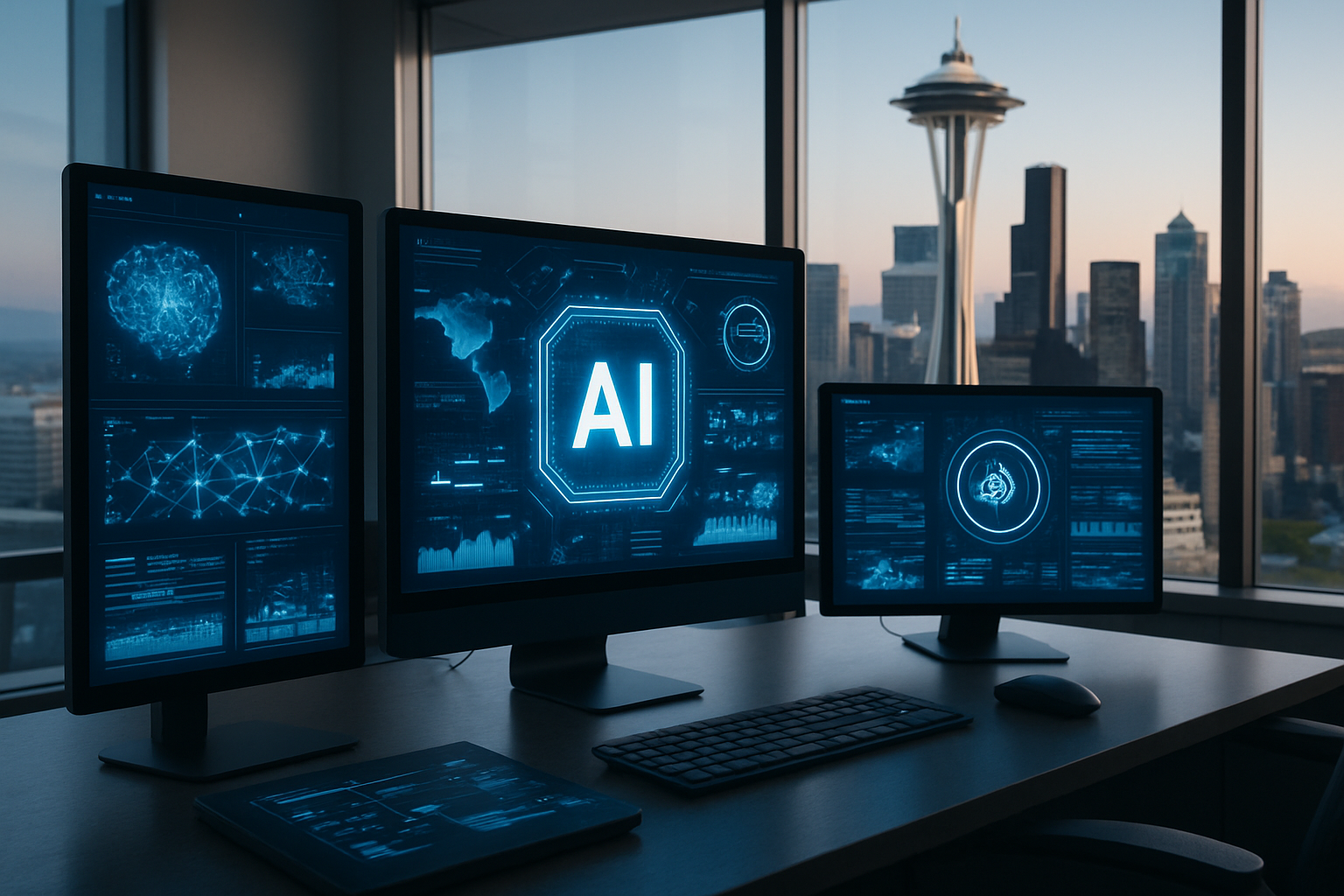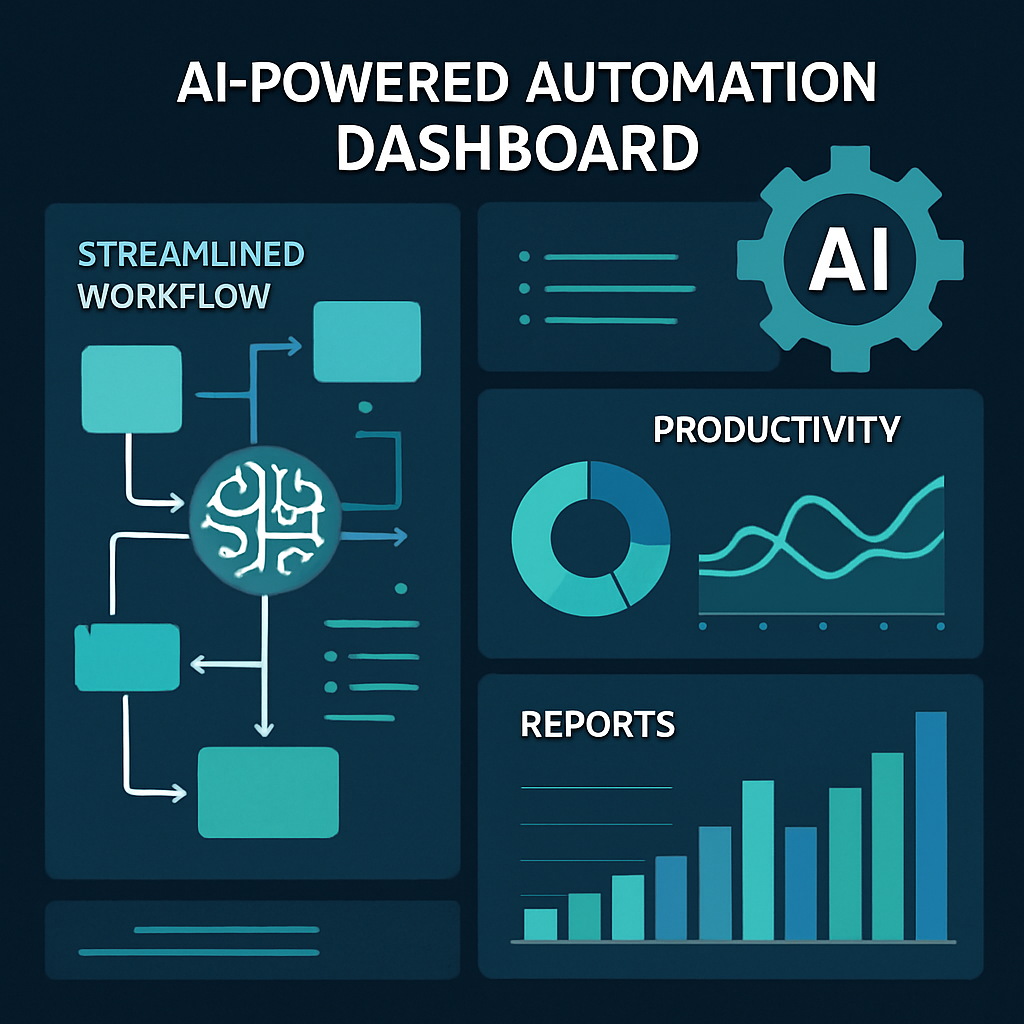In the rapidly evolving landscape of technology startups, a Seattle-based startup has emerged as a notable contender in the field of computer automation. Bolstered by the support of an ex-Google CEO and having secured a robust funding round of $16 million, this tech startup is setting its sights on revolutionizing how businesses handle repetitive tasks. The injection of capital underscores a growing confidence in automation solutions that streamline tasks traditionally performed by human operators, promising to elevate productivity solutions across various industries.
This venture capital-backed initiative is particularly significant given the increasing demands for efficient software development and process optimization. By harnessing AI and machine learning, the startup aims to reduce operational bottlenecks and empower enterprises to reallocate human resources toward more strategic activities. Such a move reflects broader industry trends where automation is no longer a future ambition but a present necessity.
Seattle’s vibrant tech ecosystem continues to give birth to innovation hubs, and this startup’s emergence highlights the city’s growing influence beyond established giants. The collaboration with an ex-Google CEO adds a layer of strategic insight and credibility, attracting further investment and providing a roadmap for scalability. As the company advances, its solutions could redefine how repetitive tasks are approached, potentially impacting a wide spectrum of sectors including finance, healthcare, and customer service.
Amidst a competitive funding environment, the successful capital raise indicates investor belief not only in the technology but also in the leadership guiding the startup. The venture’s ability to marry advanced AI capabilities with practical automation tools marks an important intersection of innovation and application. As automated systems become integral to digital transformation journeys, this Seattle-based startup exemplifies how targeted investment and expert backing can accelerate the adoption of cutting-edge productivity tools.
How Seattle-Based Startups Are Driving Innovation in Computer Automation
Seattle has long been recognized as a fertile ground for technology startups, especially those focused on developing groundbreaking software and automation tools. The city benefits from a rich talent pool stemming from tech giants and academia alike, creating a dynamic environment ripe for innovation. This climate has enabled startups to thrive, particularly in the realm of streamlining repetitive computer tasks through automation.
A Seattle-based startup’s success in securing $16 million in funding illustrates this trend vividly, positioning the company at the forefront of computer automation development. Supported by an ex-Google CEO whose strategic experience and network open doors to venture capital, the startup leverages industry expertise to accelerate its growth trajectory. This backing is vital in an ecosystem where financial and intellectual resources converge to foster innovation.
The startup’s core offering centers on AI-powered automation platforms designed to augment productivity solutions. By automating monotonous, low-value tasks, the technology helps businesses save time and cut costs, allowing employees to concentrate on higher-impact projects. This approach aligns well with current software development best practices, which prioritize efficiency and scalability.
Main factors contributing to Seattle’s prominence in tech startups:
- Diverse Tech Ecosystem: Seattle hosts both established corporations and emerging startups, fostering collaboration and knowledge exchange.
- Availability of Venture Capital: Local and global venture capital funds are increasingly investing in startups with disruptive technologies.
- Talent Pool: Proximity to universities and research centers provides a constant influx of skilled professionals.
- Supportive Infrastructure: Access to co-working spaces, accelerators, and mentorship programs specifically targeting automation and AI solutions.
Additionally, the involvement of the ex-Google CEO enhances the startup’s ability to tap into strategic partnerships and guidance. Google’s legacy of innovation and leadership in AI and software development offers a solid blueprint for success. Support from such a seasoned figure not only helps in securing funding but also in building a product roadmap that is responsive to market needs.
| Startup Attribute | Impact on Automation Success |
|---|---|
| Experienced Leadership (ex-Google CEO) | Provides strategic direction and credibility. |
| Strong Funding ($16 million) | Accelerates product development and market reach. |
| AI-Powered Platform | Efficiently streamlines repetitive tasks. |
| Seattle Location | Access to talent and venture capital. |
This combination of factors reveals why Seattle remains a hotbed for startups intent on pushing the boundaries of computer automation and productivity enhancement.

Role of Ex-Google CEO in Accelerating Venture Capital Backing of Automation Startups
Having an ex-Google CEO supporting a startup is a pivotal advantage, often translating into greater venture capital interest and trust. Such leadership brings unparalleled insights into managing growth, guiding software development teams, and anticipating industry trends. These attributes are crucial in a field as competitive and fast-moving as computer automation.
Entrepreneurs and investors alike view former Google executives as harbingers of innovation, thanks to Google’s history of successful project deployments in AI, cloud computing, and automation. The ex-Google CEO involved with the Seattle-based startup plays a vital role in:
- Strategic Fundraising: Utilizing a high-profile background to secure significant investment rounds, including the recent $16 million backing.
- Product Development Guidance: Steering the startup’s software engineering efforts towards scalable, impactful solutions.
- Establishing Industry Relationships: Connecting with potential partners, clients, and other stakeholders in the technology ecosystem.
- Talent Acquisition: Attracting top-tier tech professionals familiar with cutting-edge software and automation innovations.
The infusion of venture capital secured under this leadership enables the Seattle-based startup to increase research and development capacity, refine its AI algorithms, and expand its customer base. This, in turn, accelerates the adoption of automated workflows that streamline repetitive tasks across business functions.
Moreover, such leadership fosters an environment of credibility and ambition, which is essential when a startup navigates the complexities of software development and market entry. The track record associated with a former Google CEO significantly de-risks the startup for investors and partners.
| Leadership Contribution | Impact on Startup Growth |
|---|---|
| Fundraising and Investment | Secured $16 million in funding. |
| Product Vision and Strategy | Directed focus on AI-powered automation. |
| Industry Networking | Built strategic partnerships in tech ecosystem. |
| Team Building | Attracted top talent in AI and software development. |
Technological Approaches to Streamlining Repetitive Tasks with AI Automation
Automation of repetitive computer tasks has evolved considerably, from simple scripts to sophisticated AI-driven systems. The Seattle-based startup leverages cutting-edge techniques to create a robust platform designed specifically to enhance productivity and software development workflows.
Key technologies employed include:
- Machine Learning Algorithms: These enable the system to learn from user behavior and optimize task execution over time.
- Natural Language Processing (NLP): Allows the automation platform to understand and respond to user commands via conversational interfaces.
- Robotic Process Automation (RPA): Facilitates the automation of structured, rule-based workflows traditionally handled by humans.
- Cloud Integration: Ensures scalable deployment and real-time data access for automated processes.
This combination results in an AI automation platform capable of observing human interactions on computers, identifying repetitive patterns, and autonomously initiating task completion sequences. For instance, in customer service, the software can manage data entry and follow-ups without human intervention, significantly reducing turnaround times.
Examples of use cases include:
- Data Processing: Automated extraction and compilation of data from various sources.
- IT Support: Intelligent ticket management and resolution automation.
- Sales Operations: Automating lead qualification and follow-up communications.
- Financial Reporting: Streamlining report generation and compliance checks.
| Technology Component | Functionality | Business Benefits |
|---|---|---|
| Machine Learning | Task pattern recognition | Improved efficiency and accuracy |
| NLP | User interaction understanding | Enhanced usability and accessibility |
| Robotic Process Automation | Workflow automation | Reduced operational costs |
| Cloud Integration | Scalable deployment | Flexibility and real-time updates |

Impact of Automation on Business Productivity and Software Development Efficiency
The continued advancement of AI and automation technologies is profoundly reshaping business productivity paradigms. The Seattle-based startup is emblematic of this shift, with its solutions enabling organizations to tackle repetitive tasks more efficiently, thereby freeing human resources for more creative and strategic work.
Automation impacts software development and broader business functions in multiple ways:
- Acceleration of Development Cycles: Automating routine coding tasks and testing reduces time to market.
- Improved Accuracy and Consistency: Software automation minimizes human error, elevating product quality.
- Cost Reduction: Less manual intervention translates into savings on labor and operational expenses.
- Enhanced Scalability: Automated systems can handle growing data and workflow volumes without proportional increases in workforce.
Beyond software development, the adoption of automation tools contributes to better compliance and risk management, as processes become standardized and auditable. For businesses, the promise of increased productivity is compelling, especially as competition intensifies and digital transformation becomes a strategic imperative.
| Benefits of Automation | Examples in Software Development |
|---|---|
| Faster Task Completion | Automated code generation and testing |
| Higher Quality Outputs | Reduced bugs and errors in releases |
| Cost Efficiency | Lower need for manual QA and support staff |
| Scalability | Automated deployment pipelines |
As in the Seattle startup’s case, securing funding is critical to continuing innovation in this space. Investors increasingly recognize the value of automation solutions that empower companies to streamline workflows and drive productivity. This trend is echoed across the tech sector and is closely aligned with broader economic shifts toward digital-first operations.
Challenges and Future Prospects for AI-Driven Automation in Business Operations
Despite the transformative potential of AI-driven automation, the journey to widespread adoption is not without challenges. The Seattle-based startup’s experience highlights both obstacles and opportunities inherent in scaling automated solutions.
Some common challenges include:
- Data Privacy and Security: Handling sensitive information requires stringent data protection measures.
- Integration Complexity: Merging automation platforms with legacy systems can be technically demanding.
- Resistance to Change: Organizations may face cultural and operational pushback from employees wary of job displacement.
- Technology Maturity: Ensuring AI algorithms perform reliably across diverse use cases remains a constant focus.
Looking ahead, AI and automation are expected to become even more intelligent, adaptive, and pervasive. Enhanced natural language understanding, predictive analytics, and autonomous decision-making will further streamline business operations. Investments like the $16 million funding secured by the Seattle startup provide the resources necessary for iterative development and refinement of these technologies.
Future prospects also suggest growing collaboration between startups and established enterprises to co-create solutions tailored to specific industries. The evolution of automation platforms toward greater ease of use and integration will likely accelerate adoption rates.
| Challenge | Potential Solutions | Future Outlook |
|---|---|---|
| Data Privacy | Implementing advanced encryption and compliance frameworks | Stricter regulations and trust-building |
| System Integration | Developing API-driven architectures and middleware | Smoother legacy-modern system interoperability |
| Workforce Concerns | Employee retraining and transition programs | Balanced human-machine collaboration models |
| Technology Reliability | Continuous algorithm testing and validation | Robust, trustworthy AI automation |
As AI-integrated automation progresses, it will increasingly define the future of work and productivity. Startups backed by industry leaders and venture capital, such as the Seattle-based company, are set to play a pivotal role in this transformation, continuing to push boundaries and establish new standards.
Frequently Asked Questions about Seattle-Based AI Automation Startups
- What makes Seattle a hotspot for AI and automation startups?
Seattle’s diverse tech ecosystem, access to venture capital, and a strong talent pool from local universities create an ideal environment for these startups. - How does ex-Google CEO involvement impact startup success?
Leadership from a former Google executive brings strategic vision, credibility, and access to networks that can secure funding and partnerships crucial for growth. - What types of repetitive tasks are most effectively automated?
Tasks such as data entry, report generation, ticket management, and routine communications are prime candidates for AI-driven automation. - What challenges do startups face when implementing automation solutions?
Issues include data privacy, legacy system integration, employee resistance, and ensuring reliable AI performance across domains. - How will automation shape the future of software development?
Automation accelerates development cycles, improves code quality, reduces costs, and enables scalable delivery pipelines, fundamentally changing software production.
Additional insights and updates on related topics can be found through resources such as Snyk’s latest AI platform launch and emerging SaaS startups in 2025, which reflect the broader momentum in AI-powered productivity tools.


